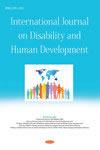Cognitive performance in aphasia due to stroke: a systematic review
International Journal on Disability and Human Development
Pub Date : 2017-01-24
DOI:10.1515/ijdhd-2016-0011
引用次数: 39
Abstract
Abstract Introduction: Aphasia persists in about one third of the patients with left hemisphere stroke, yet it is not known if it enhances the risk of dementia, beyond what results from any focal brain lesion. This lack of knowledge is mostly related to the difficulty of cognitive evaluation in people with aphasia. The development of tools aiming to assess cognitive functioning in people with aphasia could overcome this limitation. The aim of this systematic review was to evaluate the frequency and the profile of cognitive impairment in stroke patients with aphasia, to assemble existing non-verbal instruments to be used in patients with language disorders. Methods: We conducted a systematic review, through Web of Science, Medline and PsycINFO electronic databases, of articles published between January 1995 and October 31, 2015 related to aphasia due to stroke and non-verbal neurobehavioral tests. Results: The electronic search identified 2487 citations. After screening 38 were included in this review. Additionally 53 articles were selected among the references of analyzed publications of which nine were included producing a total of 47 articles. The cognitive tests more frequently used in persons with aphasia are the Figures Memory Tests, Visual Memory Span, Progressive Matrices, Wisconsin Card Sorting Test and some measures of the Test of Everyday Attention, covering a reasonable range of cognitive domains. The majority of studies across cognitive domains reported lower scores for patients with aphasia compared with controls. No specific difficulties were reported regarding tests applicability. Conclusion: There are several tools available to assess cognitive functions in aphasia. Although there is some variability, patients with aphasia tend to present lower scores than those with left hemisphere stroke without aphasia or healthy subjects. A consensus tool should be developed to screen or evaluate cognition and dementia in individuals with language impairment.脑卒中失语症的认知表现:一项系统综述
摘要简介:大约三分之一的左半球中风患者患有失语症,但目前尚不清楚它是否会增加患痴呆症的风险,超过任何局灶性脑损伤的风险。这种知识的缺乏主要与失语症患者的认知评估困难有关。旨在评估失语症患者认知功能的工具的开发可以克服这一限制。这项系统综述的目的是评估失语症中风患者认知障碍的频率和特征,并组装现有的非语言工具用于语言障碍患者。方法:我们通过Web of Science、Medline和PsycINFO电子数据库,对1995年1月至2015年10月31日期间发表的与中风失语症和非语言神经行为测试有关的文章进行了系统综述。结果:电子检索共发现2487篇引文。筛选后,本综述共纳入38例。此外,从分析的出版物的参考文献中选择了53篇文章,其中9篇共产生47篇文章。失语症患者常用的认知测试有图形记忆测试、视觉记忆广度测试、进行性矩阵测试、威斯康星卡片分类测试和日常注意力测试,涵盖了合理的认知领域。大多数跨认知领域的研究报告称,失语症患者与对照组相比得分较低。没有关于测试适用性的具体困难报告。结论:失语症患者的认知功能有多种评估工具。尽管存在一些变异性,但失语症患者的得分往往低于没有失语症的左半球中风患者或健康受试者。应该开发一种共识工具来筛查或评估语言障碍患者的认知和痴呆症。
本文章由计算机程序翻译,如有差异,请以英文原文为准。
求助全文
约1分钟内获得全文
求助全文

 求助内容:
求助内容: 应助结果提醒方式:
应助结果提醒方式:


